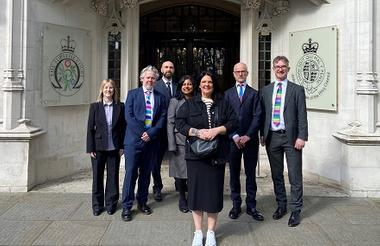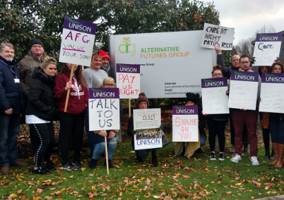The Supreme Court has ruled in favour of a charity worker in a case that centred on employees’ freedom to take part in strike action.
Care worker Fiona Mercer previously won an employment appeal tribunal case against her former employer Alternative Futures Group (AFG) after the charity had suspended her following her participation in strikes related to a pay dispute.
Her case has since been escalated through the courts after the government intervened.
This week, Supreme Court judges declared that UK trade union legislation was incompatible with the European Convention on Human Rights (ECHR).
“If employees can only take strike action by exposing themselves to detrimental treatment, the right dissolves,” the judgment reads.
“Nor is it clear what legitimate aim a complete absence of such protection serves. In the context of the scheme of protection that is available, it is hard to see what pressing social need is served by a general rule that has the effect of excluding protection from sanctions short of dismissal for taking lawful strike action.”
Background to case
As a workplace representative of workers’ union Unison, Mercer planned and took part in lawful strike action at AFG in 2019.
AFG subsequently suspended Mercer, during which time she received normal pay but was unable to earn money for the overtime she would otherwise have worked.
The charity’s continued position, despite the ruling against it, is that its actions were unrelated to the strike action.
Mercer brought a claim against AFG under section 146 of the Trade Union and Labour Relations (Consolidation) Act 1992 (TULRCA) that she had suffered detrimental treatment in relation to her industrial action.
An employment tribunal ruled that section 146 of TULRCA did not protect workers such as Mercer from detriment short of dismissal for participation in lawful industrial action as a member of an independent trade union.
However, an employment appeal tribunal ruled in favour of Mercer that the UK legislation could be interpreted as doing so.
This concluded AFG’s participation in the case. The charity did not pay a settlement to Mercer.
The Court of Appeal allowed a further appeal by former business secretary Kwasi Kwarteng that section 146 of TULRCA could not be interpreted compatibly with article 10 of the ECHR but did not make a declaration of incompatibility.
This week, Supreme Court judges declared that the legislations were incompatible.
Charity respects Supreme Court decision
Mercer said yesterday she was “delighted” at the outcome of the case.
“Although it won’t change the way I was treated, it means irresponsible employers will now think twice before behaving badly towards their unhappy staff.
“If they single strikers out for ill-treatment, they’ll now be breaking the law.”
An AFG spokesperson said: “We are aware of the Supreme Court case judgement in relation to Unison on behalf of Fiona Mercer released today.
“The case decided a point of law and was considered following an intervention by the Secretary of State at appeal court stage.
“AFG did not participate at either Court of Appeal or Supreme Court level.
“AFG respect the decision of the Supreme Court related to an employees’ right to strike however the case itself has not been decided by the decision.”
Meanwhile, a government spokesperson said: “The ability to strike is rightly subject to limitations and conditions in the UK so that the interests of workers is balanced fairly with those of employers and the general public.
“The government will consider the judgment carefully before responding, but there is plenty of recent evidence that workers are perfectly able to take part in lawful industrial action to defend their interests without being put off by concerns about unfair or unreasonable sanctions imposed by employers.”
Union: ‘Most important industrial action case for decades’
Unison general secretary Christina McAnea said: “This is the most important industrial action case for decades.
“It’s a victory for every employee who might one day want to challenge something bad or unfair their employer has done.
“Rogue bosses won’t like it one bit. They’ll no longer be able to punish or ill-treat anyone who dares to take strike action to try to solve any problems at work.
“No one strikes on a whim. There are many legal hoops to be jumped through first. But when a worker decides to walk out, they should be able to do so, safe in the knowledge they won’t be victimised by a spiteful boss.
“The government must now close this loophole promptly. It won’t cost any money and isn’t difficult to do. Today is a day to celebrate.”
Related Articles












